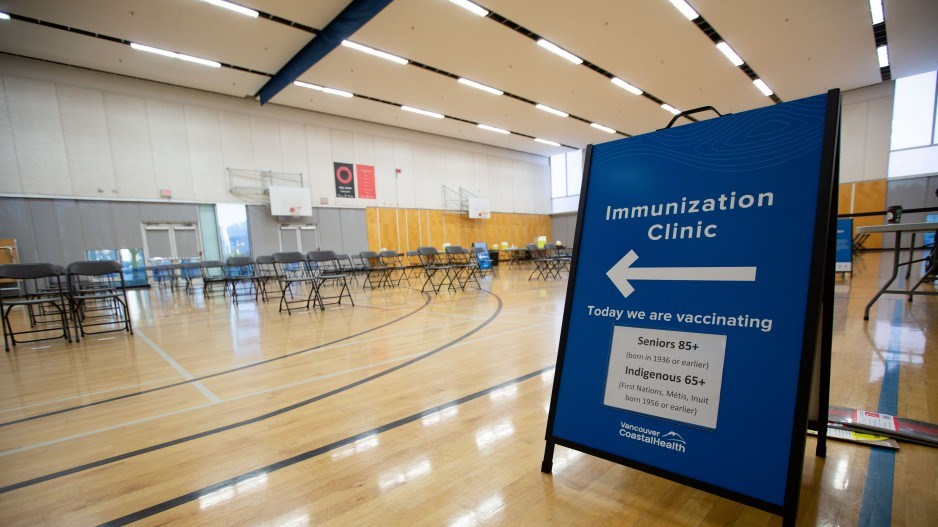Mass vaccination clinics opened Monday in B.C. and the province looks set to accelerate bookings in the coming weeks.
But bookings for most British Columbians will still have to be done by phone for now, the province’s top doctor confirmed.
Fraser Health is the only local health authority offering online booking.
The remaining four health authorities require residents call into call centres maintained by Telus Corp., a situation that resulted in considerable bottlenecks on the first day of bookings last week.
B.C. provincial health officer Dr. Bonnie Henry an online booking portal for the rest of the province is coming but “the target for that is still unfortunately a few weeks away.”
The province has previously targeted an April 12 launch.
Bookings for vaccine appointments began last week with those 90 years old and above and Indigenous seniors 65 years old and above.
Those groups began getting their jabs Monday, while scheduling will open to those 84, 83, 82 and 81 beginning Tuesday, Wednesday, Thursday and Friday of this week, respectively.
Meanwhile, Henry tried to assuage concerns over the risk of the just-approved AstraZeneca plc vaccine to British Columbians after some European countries suspended its use amid reports of blood clots.
The World Health Organization said there is no link between the vaccine and clotting.
And out of the 17 million doses of AstraZeneca vaccine administered globally, Henry pointed out there have been 37 reports of potential blood clots following the jab.
“This is lower than we might see even in the general population without vaccinations,” she said.
Meanwhile, the province while the rest of the province receives doses based on age groups.
“What we are looking at is businesses that are operating … using COVID safety plans, where there is an ongoing risk in the workplace to workers in those settings,” Henry said.
Monday’s joint statement from the Ministry of Health and the Office of the Provincial Health Officer highlighted four categories of workplaces considered to be at highest risk of COVID-19:
·Food processing plants, including poultry, fish and fruit processing
·Agricultural businesses that rely on workers living together. For example, those that bring in temporary foreign workers seasonally to help with harvests.
·Large industrial camps
·Other large operations in which workers live together and where quarantine is difficult
So far, 500,000 doses of the AstraZeneca vaccine from the Serum Institute of India have been delivered to Canada.
Prior to Monday’s broader rollout of vaccinations, the province had been prioritizing residents and staff at long-term care facilities, essential visitors to those facilities, residents and staff and assisted living residences, higher-risk hospital staff and paramedics, as well as those living in remote or isolated First Nations communities.
To date, 409,103 doses have been administered across B.C., 87,059 of which are second doses.
That’s up from the 380,743 doses administered as of Friday, 87,024 of which were second doses.
Earlier this month the province extended the interval between vaccine doses from six weeks to 16 weeks, meaning fewer second doses are on the immediate horizon as B.C. accelerates plans to offer more first doses to the broader population.
